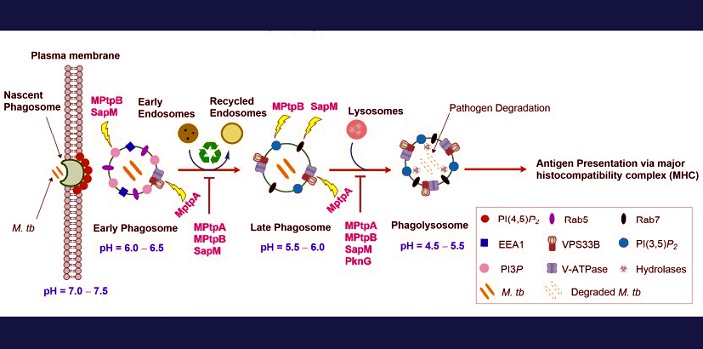Nikhil Prasad Fact checked by:Thailand Medical News Team Nov 21, 2024 4 months, 3 weeks, 2 days, 3 hours, 54 minutes ago
Medical News: Tuberculosis (TB) continues to challenge global health systems, and understanding how the bacteria evade our immune defenses is crucial. Researchers at Curtin Medical School and Curtin Health Innovation Research Institute, Australia, have uncovered how Mycobacterium tuberculosis (M. tb) undermines our immune system. Their findings focus on the pathogen's secreted kinases and phosphatases - specific proteins that disrupt the body’s ability to destroy the bacteria effectively. This
Medical News report delves into their work and highlights potential treatments that could restore the immune system’s capability to fight back.
 Restoring Immunity to Fight Tuberculosis
The Role of Kinases and Phosphatases in TB Survival
Restoring Immunity to Fight Tuberculosis
The Role of Kinases and Phosphatases in TB Survival
The survival tactics of M. tb are cunning. By releasing proteins like kinases and phosphatases, the bacteria manipulate immune cells, particularly macrophages, to stop them from destroying the invader. Phosphorylation - an essential process regulated by kinases and phosphatases - becomes a weapon in the bacteria's arsenal. These proteins disrupt the critical phagosome-lysosome fusion within macrophages, a process essential for degrading harmful invaders.
Key players include:
-PknG, a kinase pivotal in preventing phagosome-lysosome fusion.
-MPtpA and MPtpB, phosphatases that interfere with cellular signals, halting the immune response.
-SapM, an acid phosphatase that blocks necessary biochemical changes in the macrophage.
Each of these proteins acts to protect the bacteria from being destroyed, allowing TB to thrive within the host.
How the Study Unfolded
The researchers analyzed M. tb proteins to determine how they impair macrophage function. Macrophages are the immune system’s first line of defense, responsible for identifying and destroying pathogens. However, M. tb has evolved to manipulate these cells, creating a safe environment for itself.
This study examines the mechanisms behind this process:
-Disrupting Phagosome Maturation: The bacterial proteins delay or prevent the transition from early to late phagosomes, crucial steps in pathogen degradation.
-Blocking Acidification: Proteins like MPtpA disrupt the movement of V-ATPase to phagosomes, stopping the acidification needed for pathogen destruction.
-Hydrolyzing Key Lipids: Both MPtpB and SapM attack lipids like PI3P and PI(3,5)P2, preventing the necessary fusion events between phagosomes and lysosomes.
Promising Therapeutic Insights
One of the most exciting outcomes of this research is the identification of potential inhibitors targeting these bacterial proteins. By disabling M. tb’s ability to manipulate macrophages, these inhibitors could pave the way for new T
B treatments.
Key Findings:
-PknG Inhibitors: AX20017, a selective inhibitor, effectively promotes phagosome-lysosome fusion and accelerates bacterial degradation. Its high specificity minimizes the risk of affecting human proteins, making it a promising candidate for drug development.
-MPtpA Inhibitors: Researchers found that targeting MPtpA restores macrophage function, increasing the body’s ability to clear the bacteria.
-SapM and MPtpB Inhibitors: Compounds that block these phosphatases allow for normal phagosome maturation and enhance immune response.
The research highlights several compounds that act on these bacterial proteins with remarkable results. For instance, PknG inhibitors like AX20017 not only improve macrophage function but also show potential in overcoming antibiotic resistance by preventing TB from entering a dormant state. Similarly, blocking MPtpA and SapM demonstrated significant reductions in bacterial load during laboratory tests. These discoveries bring hope for improving TB treatment outcomes.
Conclusion: Toward a Future Free of TB
This groundbreaking work by Curtin University researchers highlights the critical role of M. tb kinases and phosphatases in the bacteria’s survival within human hosts. By targeting these proteins, it’s possible to restore the immune system’s natural ability to fight TB, paving the way for innovative treatments.
The potential of these inhibitors to work alongside current antibiotics or as standalone therapies opens new avenues in TB management. Moreover, understanding the molecular mechanisms behind M. tb’s survival tactics allows for the design of more effective and specific drugs, reducing side effects and improving patient outcomes.
The study findings were published in the peer-reviewed International Journal of Molecular Sciences.
https://www.mdpi.com/1422-0067/25/22/12481
For the latest TB News, keep on logging to Thailand
Medical News.
Read Also:
https://www.thailandmedical.news/news/low-vitamin-c-levels-associated-with-persistent-tuberculosis-symptoms
https://www.thailandmedical.news/news/how-tuberculosis-manipulates-human-genes-for-survival
https://www.thailandmedical.news/articles/tuberculosis-tb-news
